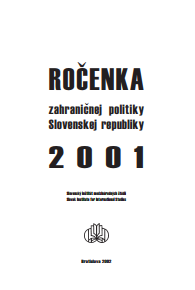
We kindly inform you that, as long as the subject affiliation of our 300.000+ articles is in progress, you might get unsufficient or no results on your third level or second level search. In this case, please broaden your search criteria.

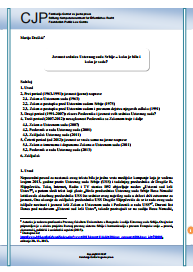
Pitanje javnosti rada Ustavnog suda, koje je izazvalo tako veliku polemiku kako među samim sudijama Ustavnog suda tako i u profesionalnim krugovima i medijskoj javnosti, verovatno da nije zasluživalo veliki prostor i vreme koje je potrošeno da bi se razjasnilo o čemu je zapravo reč. Ustavna garancija javnosti rasprave pred Ustavnim sudom, uz opšteprihvaćene standarde za isključenje javnosti (koji se odnose na zaštitu interesa nacionalne bezbednosti, javnog reda i morala u demokratskom društvu, kao i zaštitu interesa maloletnika ili privatnosti učesnika u postupku), odnosila se oduvek samo na javno raspravljanje učesnika u postupku pred Ustavnim sudom. Iznenada, neoprezno i bez dovoljne svesti o posledicama, Poslovnik o radu Ustavnog suda iz 1991. godine neočekivano je javnost uveo i na sve redovne sednice Ustavnog suda, na kojima se nije odvijala javna rasprava, već se na njima obavljalo većanje i glasanje sudija o predloženoj odluci. Moguće je pretpostaviti da se to dogodilo usled nedovoljnog razlikovanja faze većanja od ostalih faza u postupku odlučivanja Ustavnog suda u predmetima klasične ustavnosudske nadležnosti u normativnoj kontroli. Nažalost, iako je takva nezakonita praksa trajala godinama, neprirodnost slike „direktnog prenosa svega onog što se događalo na sednici Suda“ ili sudije koji učestvuje u većanju i glasanju, a svoja gledišta iznosi pred predstavnicima medija i svoja uverenja brani uz nadzor televizijskih kamera, nije time bila manje upečatljiva.
More...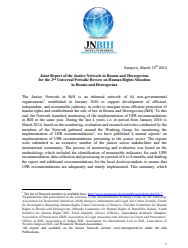
(English edition) The Justice Network in BiH is an informal network of 64 non-governmental organizations established in January 2010 to support development of efficient, independent, and accountable judiciary, in order to instigate more efficient protection of human rights and establishment the rule of law in Bosnia and Herzegovina (BiH). To this end, the Network launched monitoring of the implementation of UPR recommendations in BiH in the same year. During the last 4 years, i.e. in period from January 2010 to March 2014, based on the monitoring, evaluation and research activities conducted by the members of the Network gathered around the Working Group for monitoring the implementation of UPR recommendations, we have published 4 annual reports on implementation of UPR recommendations pertaining to the justice sector. The reports were submitted to an extensive number of the justice sector stakeholders and the international community. The process of monitoring and evaluation was based on the methodology which included the identification of measurable indicators for each UPR recommendation, data collection and processing in a period of 6 to 8 months, and drafting the report and additional recommendations for the local decision-makers to ensure that UPR recommendations are adequately and timely implemented. This summary, which was the subject of extensive consultations within and outside the Network, was prepared on the basis of the aforementioned reports.
More...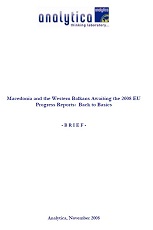
Facing 5 November 2008, when the Commission is to publish the progress reports, Macedonia and the wider Balkan region are considering the options for speeding up the process of accession to the EU. However, the difficulties faced with regards to political reforms, such as lack of political dialogue between the government and opposition decreases the likeliness that Macedonia will start accession talks in the years to come unless there is consolidated reform process that would be tested in the upcoming elections of March 2009.
More...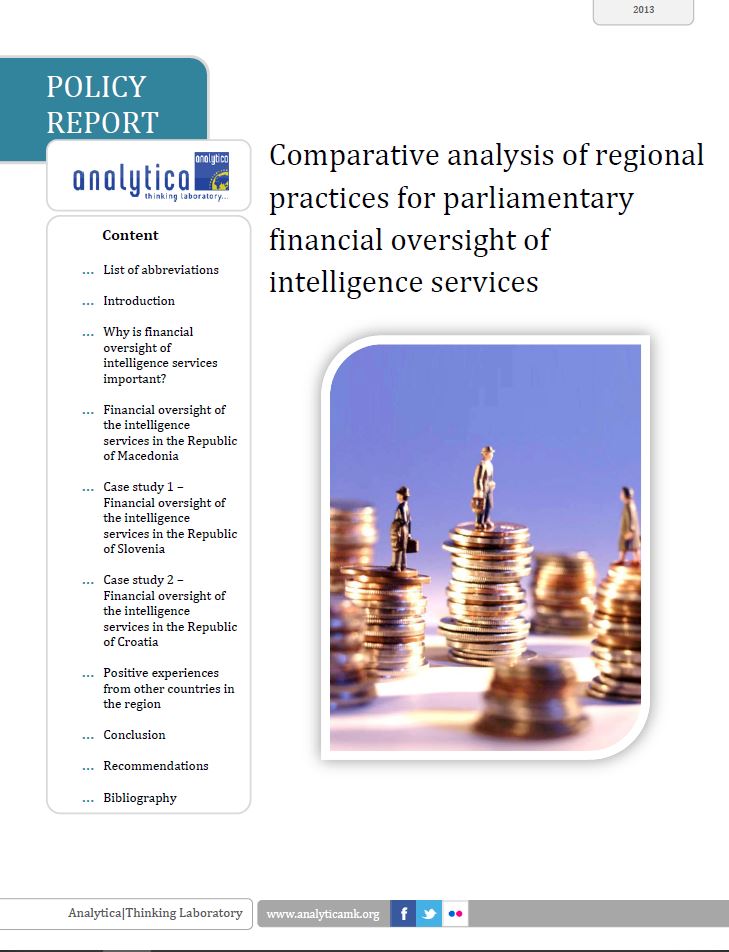
This paper will give an account of the mechanisms available to the Macedonian Parliament to conduct parliamentary oversight of the intelligence services, particularly those within the jurisdiction of the specialized parliamentary committees. It will then examine cases from other states in the region and look for practices and legal solutions that they have established in order to encourage financial accountability of their intelligence services. As former Yugoslav republics, during the last two decades these states were facing the challenges of transition and building democratic, transparent and accountable institutions. However, not all of them have progressed at the same pace. The best practices are elaborated in two case-studies – Slovenia and Croatia, both members of the European Union. Furthermore, their oversight systems differ at many levels, having been created and developed according to each country’s specific processes and needs. They should serve as examples to better understand the role of parliaments in ensuring the accountability of intelligence services in the implementation of programs and projects financed with state money. Thereby, the case-study sections provide a brief overview of the formal intelligence services and authorized bodies for their oversight. The focus is put on the role of the parliament (directly or indirectly through parliamentary committees) throughout the four phases of the budgetary cycle: planning, adoption, implementation and audit.
More...
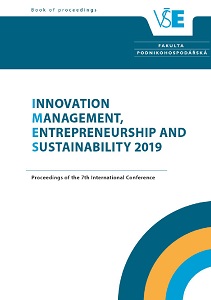
The 7th International Conference Innovation Management, Entrepreneurship and Sustainability (IMES 2019) took place on May 30 – 31, 2019 at the University of Economics, Prague. The conference was organised by the Department of Entrepreneurship of the University of Economics, Prague, Czech Republic in cooperation with other partners.Sound keynote speakers – Martina Musteen (San Diego State University, USA), Ilan Alon (University of Agder, Norway), Andrew Burke (Trinity Business School, Ireland), Arnim Wiek (Arizona State University, USA), Søren Salomo (Technical University Berlin, Germany) and Roy Thurik (Erasmus University Rotterdam, Netherlands) discussed the trends in the fields of innovation management, entrepreneurship and sustainability. The conference aimed to achieve academic excellence in a regional context and to establish a platform for mutual collaboration, exchange and dissemination of ideas among researchers and professionals.These conference proceedings contain contributions of the conference participants presented during both days of the conference. Authors of papers come from 22 countries all over the world, namely from Belgium, Bosnia and Herzegovina, Brazil, Bulgaria, Colombia, Croatia, Czech Republic, Finland, France, Germany, Hungary, India, Mexico, Paraguay, Poland, Portugal, Russian Federation, Slovakia, Sweden, Switzerland, USA and Vietnam. All these contributions have successfully passed the doubleblind peer-review process.
More...
Purpose: The main aim of our study was to contribute to this increasing body of the regional entrepreneurship literature by a better understanding of the regional entrepreneurial activity in Slovakia as an example of post-communist economy. Design/methodology/approach: We exploit the existing measures of entrepreneurship from Global Entrepreneurship Monitor and Statistical Office of the Slovak Republic, and we explore the inter-regional differences in the levels of entrepreneurial activity among eight Slovak NUTS 3 regions during years 2011-2015. We also employ the multivariate regression models and empirically investigate the relationship between the business environment and entrepreneurial activity in Slovakia. Findings: The average engagement in entrepreneurship in Slovakia was during the analysed period 16-18% of the economically active population depending on the measure used. The results of multivariate regression models have shown that the overall improvement of the general business environment positively influences the levels of entrepreneurship in Slovakia. Research/practical implications: We believe that such an observation may serve as an encouragement for the further efforts invested in improving business conditions for the established and new Slovak entrepreneurs. We also encourage future researchers to study further other location factors of entrepreneurial activity such as cultural, logistic and socioeconomic variables. Future research might also address the role of entrepreneurial infrastructure and public entrepreneurship and SME policies. Originality/value: The presented study empirically contributes to the body of knowledge on the regional entrepreneurship and the conducted approach towards quantification of the entrepreneurial activity might serve as an inspiration for other scholars.
More...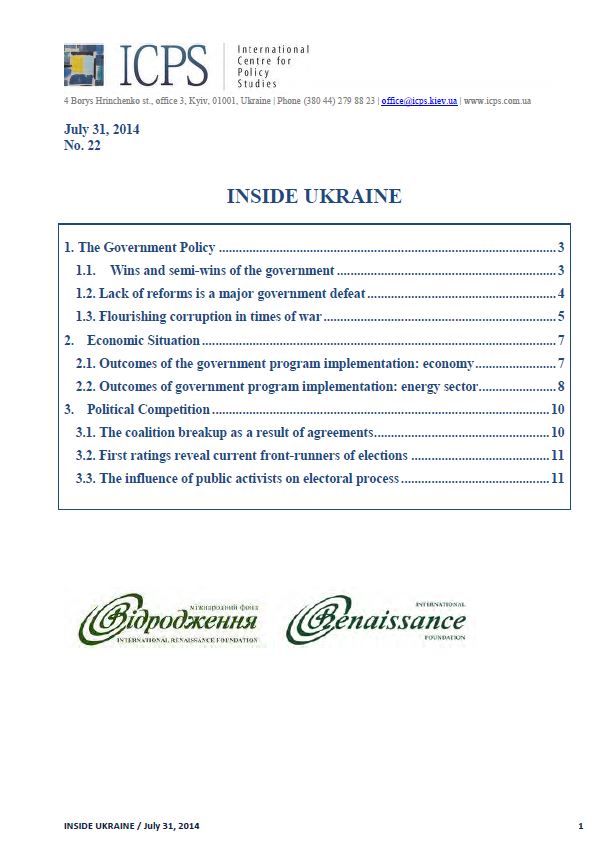
1. The Government Policy // 1.1. Wins and semi-wins of the government // 1.2. Lack of reforms is a major government defeat // 1.3. Flourishing corruption in times of war // 2. Economic Situation // 2.1. Outcomes of the government program implementation: economy // 2.2. Outcomes of government program implementation: energy sector // 3. Political Competition // 3.1. The coalition breakup as a result of agreements // 3.2. First ratings reveal current front-runners of elections // 3.3. The influence of public activists on electoral process
More...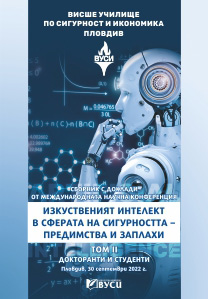
The report looks at basic concepts and aspects related to artificial intelligence in the field of security and corruption. Attention has been paid to the role of artificial intelligence in identifying corrupt officials in individual countries. Examples are given of how artificial intelligence can threaten the national security of the country.
More...
The thesis claiming human progress is directly proportional to technological progress has become a paradigm in modern management. The knowledge of technologies, the degree we use them, the fields it is impossible not to use them, determine not only our quality of life, but also sometimes the possibility of its existence at all. Human potential can unfold on a scale unimaginable until now, thanks to the use of technology to work more efficiently, to connect us with our loved ones and friends, to have fun, to learn, to create. All this is happening in a twinkling of an eye, thanks to technology. That is why there is almost no area of human life they do not take an important place or are absolutely necessary. In this context, their importance is equally significant for public administration and local government.
More...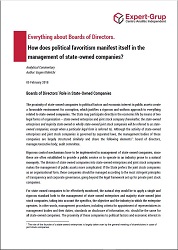
The proximity of state-owned companies to political factors and economic interest in public assets create a favourable environment for corruption, which justifies a rigorous and uniform approach to everything related to state-owned companies. The State may participate directly in the economic life by means of two legal forms of organisation – state-owned enterprise and joint stock company (hereinafter, the state-owned enterprises and majority state-owned or wholly state-owned joint stock companies will be referred to as state-owned companies, except when a particular legal form is referred to). Although the activity of state-owned enterprises and joint stock companies is governed by separated laws, the management bodies of these companies are largely structured similarly and share the following elements: board of directors, manager/executive body, audit committee.
More...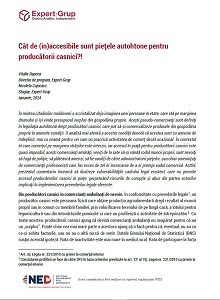
În mintea citadinilor moldoveni s-a cristalizat deja imaginea unei persoane în etate, care stă pe marginea drumului și își vinde presupusul surplus din gospodăria proprie. Acești pseudo-comercianți sunt definiți în legislația autohtonă drept producători casnici, care pot să-și comercializeze produsele din gospodăria proprie în anumite condiții. O analiză mai atentă a acestor condiții denotă că acestea sunt cu anevoie de îndeplinit, mai cu seamă pentru cei care nu practică activitatea de comerț decât ocazional. În contextul în care comerțul pe marginea străzilor este interzis, iar accesul în piață pentru producătorii casnici este quasi imposibil, acești comercianți amărâți, veniți de la sate să-și vândă rodul muncii proprii, sunt nevoiți să fugă de poliție, să plătească amenzi, să fie umiliți de către administratorii piețelor, sau chiar amenințați de comercianții profesioniști care fac exces de zel în încercarea de a-și proteja vadul comercial. Astfel, prezentul comentariu încearcă să ilustreze vulnerabilitățile cadrului legal existent, care nu permite accesul producătorilor casnici în piețe, perpetuând riscurile de corupție și abuz din partea actorilor implicați în implementarea prevederilor legale aferente.
More...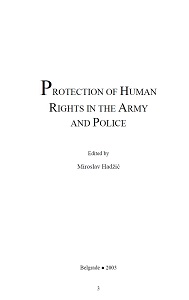
The document discusses the normative and real aspects of human rights protection in the police force, focusing on the specific rights and authorities of police officers in Yugoslavia.
More...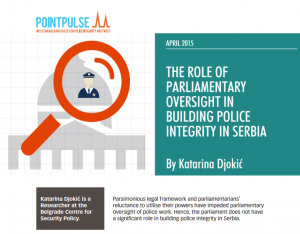
Parsimonious legal framework and parliamentarians’ reluctance to utilise their powers have impeded parliamentary oversight of police work. Hence, the parliament does not have a significant role in building police integrity in Serbia.
More...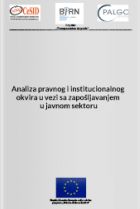
This analysis was prepared within the framework of the project Towards Transparency in Staff Recruitment, which is jointly implemented by the Center for Free Elections and Democracy (CeSID), the PALGO Center and the Balkan Investigative Reporting Network (BIRN) with the support of the European Union. The aim of the analysis is to provide insight into the legal and institutional framework for employment in the public sector, as well as to present the main characteristics of such systems in several selected European Union countries. In this sense, it is divided into two main parts - an analysis of the domestic framework (section 2) and a presentation of selected comparative legal solutions (section 3). Together with the results of the research on employment practices in selected public sector organizations, it should serve as a basis for formulating recommendations for improving regulations and employment practices in the public sector in Serbia.
More...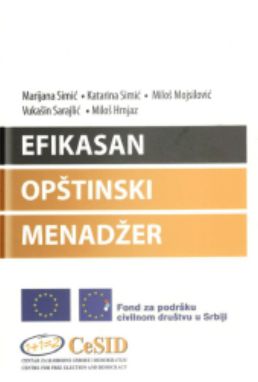
The brochure in front of you is the result of the Center for Free Elections and Democracy project »Efficient municipal manager and active and informed citizens - a step forward towards more developed municipalities«. The main goal of the mentioned project is, on the one hand, to improve the role of the municipal manager, and on the other hand, to raise the awareness of citizens about the importance of issues such as, for example, local economic development and efficient management of local self-government units.
More...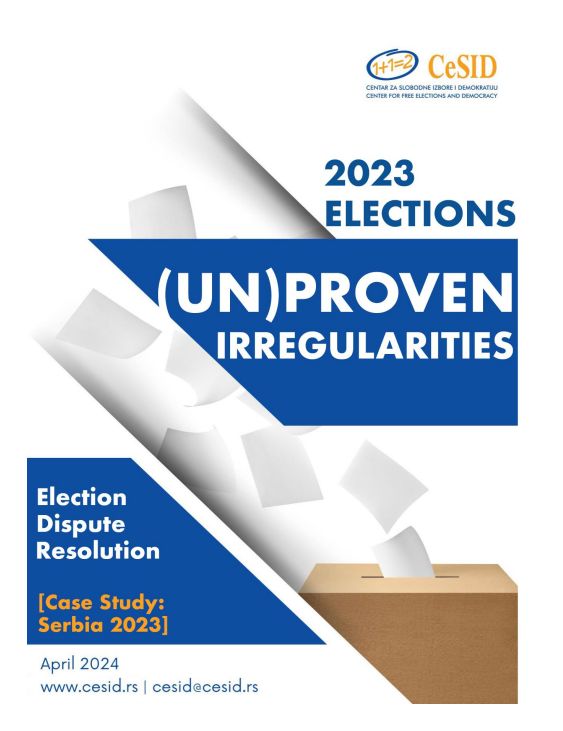
The survey (Un)proven Irregularities: Election dispute resolution in the 2023 election is the third such study stemming from CeSID’s work on electoral justice in Serbia. The first assessment of this kind, Electoral Justice: Here, Now, Tomorrow [The case of Serbia] was published in the spring of 2021 and aimed at highlighting the importance of election dispute resolution as a key pillar of the electoral process and, more specifically, deepen knowledge of this area, acquaint the public with safeguards, help build capacity of political parties and organisations, and point to priority areas for future strategic and practical interventions. The 2021 study identified prime concerns for ongoing work, and these, together with developments on the Serbian political scene (the boycott of the election, inter-party dialogue, legal amendments, and the April 2022 election) informed a second detailed survey, Election Disputes in Serbia: So what do we do now? [April 2022 elections], published by CeSID in 2022. This report sought to assess the efficiency, effectiveness, transparency, and equity of Serbia’s election dispute resolution process after the adoption and first application of the set of new election laws, as well as to aid in empowering political organisations and election contestants to take part in the process and help the general public and civil society better understand electoral procedures and safeguards.
More...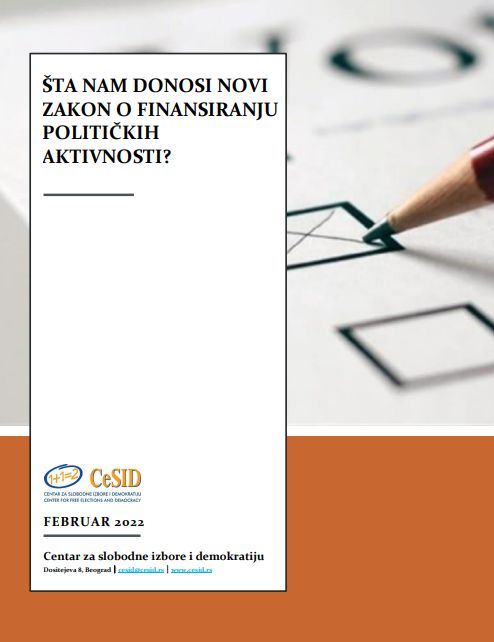
Analysis of the most important provisions in the Law on Financing political activities: CeSID's review, chronology and key news
More...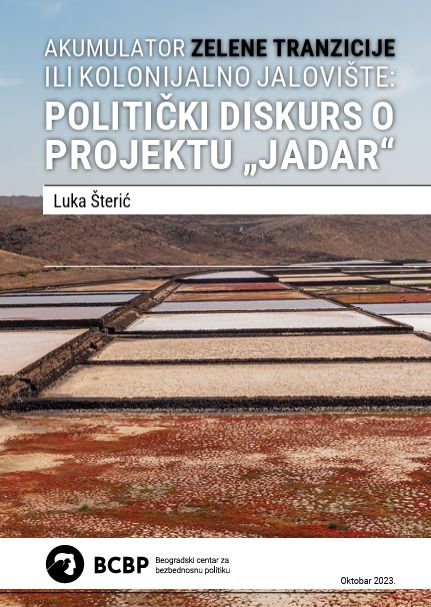
The aim of this study is to analyze the political debate regarding the "Jadar" project. The study presents the development of the debate, key actors and dominant discourses that formulated it. The first part of the work is dedicated to understanding the wider context and importance of the project in Serbia and globally. In the second part, the three phases of the development of the discourse on the project "Jadar" will be presented. Then the actors and narratives that guided the political debate will be analyzed in more detail. Finally, in the last part, we will look at how the debate affected the political arena in Serbia, as well as the possible future of the discourse on this project and environmental topics in general.
More...